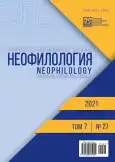Mythopoetics of the space-time continuum in Sergei Kozlov’s tales of thr Hedgehog and the Bear
- Authors: Elepova M.Y.1, Kabanova N.G.1
-
Affiliations:
- Northern (Arctic) Federal University named after M.V. Lomonosov
- Issue: Vol 7, No 27 (2021)
- Pages: 512-521
- Section: РУССКАЯ ЛИТЕРАТУРА
- URL: https://journal-vniispk.ru/2587-6953/article/view/302435
- DOI: https://doi.org/10.20310/2587-6953-2021-7-27-512-521
- ID: 302435
Cite item
Full Text
Abstract
The original tales of Sergei Kozlov about the Hedgehog and the Bear are full of deep philosophical content, which finds expression in intertextual allusions, the transformation of mythological images and formulas. A special place in the author’s discourse is occupied by the spacetime continuum, which can be defined as a continuous set of categories that embody the topological explication of the fairy world through mythopoetic imagery, religious subtext, and multiple allusions. Temporality as a text category becomes the axis of artistic time, imparting signs of perception to the entire space-time continuum of the work. The temporality of the fairytale cycle is determined by the switch from everyday specifics to the scale of an unlimited universe. The stopped time effect occurs at the moment of such switch. Out of time, the characters find themselves in the element of fantasy overwhelming them. The space has the features of impressionism, every moment in the life of fairytale heroes reveals a new look of the vernal world. The heavenly bodies in the spirit of the ancient fairy-tale epic are close to the earth and reified. Astral categories in the images of the moon, stars, sky reveal a connection with outer space. Anthropomorphic characters inhabiting the magical space of the forest, while retaining their archetypal features, acquire special properties in fairy tales that go far beyond the framework of folklore stereotypes. This is imagination and fantasy that have no boundaries, the ability to contemplate the beautiful, the ascent of thought to eternal philosophical problems. The Hedgehog, as the protagonist and the bearer of these qualities, often evaluates finiteness – the infinity of time, its cyclical nature, the constant change of death and birth. He, like other characters, overcomes real space and time with the help of imagination. The poetics of myth, archetypal imagery, artistic components of magical-fantastic tales, transformed in the author’s discourse of Sergei Kozlov, allow the writer to penetrate the innermost world of the child’s soul through the space-time continuum and present the most important ontological and epistemological problems of human existence and divine providence in the world to the adult reader.
About the authors
M. Y. Elepova
Northern (Arctic) Federal University named after M.V. Lomonosov
Email: m.elepova@yandex.ru
ORCID iD: 0000-0002-7229-5851
Doctor of Philology, Professor of Literature Department
17 Severnaya Dvina Emb., Arkhangelsk 163002, Russian FederationN. G. Kabanova
Northern (Arctic) Federal University named after M.V. Lomonosov
Author for correspondence.
Email: nataliakabanova30@gmail.com
ORCID iD: 0000-0001-8624-3481
Post-Graduate Student
17 Severnaya Dvina Emb., Arkhangelsk 163002, Russian FederationReferences
- Буслаев Ф.И. Славянские сказки // Буслаев Ф.И. Русская народная поэзия. СПб., 1861. С. 110-116.
- Азадовский М.К. История русской фольклористики: в 2 т. Т. 1. М., 1958. 479 с.
- Мелетинский Е.М. Поэтика мифа. М.: Наука, 1976. 407 c.
- Катасонов В.Н., Бернштейн В.С. Континуум // Гуманитарный портал: Концепты / Центр гуманитарных технологий, 2002–2021 (последняя редакция: 03.01.2021). URL: https://gtmarket.ru/concepts/7044 (дата обращения: 08.01.2021).
- Огнева Е.А. Темпоральная когнитивная сетка художественного текста: тенденции кроссрусской адаптации // Современные проблемы науки и образования. 2013. № 3. URL: http://scienceeducation.ru/ru/article/view?id=9354 (дата обращения: 05.01.2021).
- Козлов С.Г. Ёжик в тумане. М.: Малыш, 2019. 96 c.
- Фрейденберг О.М. Поэтика сюжета и жанра. М.: Изд-во «Лабиринт», 1997. 445 c.
- Халуторных О.Н. Волшебная литературная сказка как феномен культуры: Социально-философский анализ: автореф. дис. ... канд. филос. наук. М., 1998. 20 с.
Supplementary files









